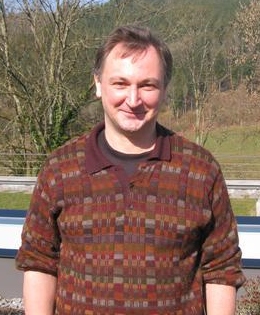Vladimir Voevodsky facts for kids
Quick facts for kids
Vladimir Voevodsky
|
|
|---|---|

Voevodsky in 2011
|
|
| Born |
Vladimir Alexandrovich Voevodsky
4 June 1966 |
| Died | 30 September 2017 (aged 51) Princeton, New Jersey, United States
|
| Nationality | Russian, American |
| Alma mater | Moscow State University Harvard University |
| Awards | Fields Medal (2002) |
| Scientific career | |
| Fields | Mathematics |
| Institutions | Institute for Advanced Study |
| Doctoral advisor | David Kazhdan |
Vladimir Alexandrovich Voevodsky (4 June 1966 – 30 September 2017) was a brilliant Russian-American mathematician. He created new ways to understand complex math problems. His work helped develop a field called homotopy theory for algebraic varieties. He also came up with something called motivic cohomology.
These big ideas led him to win the Fields Medal in 2002. This award is like the Nobel Prize for mathematicians. He was also famous for proving the Milnor conjecture and other related math puzzles. In his later years, he worked on a new way to build the foundations of mathematics, called univalent foundations.
Contents
Early Life and Learning
Vladimir Voevodsky's father, Aleksander Voevodsky, was a scientist. He led a lab that studied tiny particles. His mother, Tatyana, was a chemist. Vladimir went to Moscow State University for a while. However, he left without finishing his degree. He didn't like attending classes and struggled with the school's rules.
Later, he earned his Ph.D. in mathematics from Harvard University in 1992. He was so talented that he was accepted without even applying! His teacher, David Kazhdan, helped him a lot. When he was a young student, his advisor gave him a special book. It was called Esquisse d'un Programme by Alexander Grothendieck. Vladimir learned French just to read this important math book. He then started his own research based on its ideas.
His Amazing Math Work
Voevodsky's work combined two big areas of math: algebraic geometry and algebraic topology. He worked with another mathematician, Fabien Morel. Together, they created a new homotopy theory for schemes. These are special mathematical structures.
He also developed motivic cohomology. This new tool helped him solve a very difficult problem. It was called Milnor's conjecture. This problem connects different parts of math, like K-theory and étale cohomology. For these amazing discoveries, he received the Fields Medal. This happened at a big meeting of mathematicians in Beijing, China.
In 1998, he gave an important speech at a math conference in Berlin. He also wrote a book with Andrei Suslin and Eric M. Friedlander. The book explained the theory of motivic cohomology in detail. From 2002, Voevodsky became a professor at the Institute for Advanced Study. This is a famous research center in Princeton, New Jersey.
In 2009, he announced that he had proven the full Bloch–Kato conjectures. These were another set of complex math problems.
New Ways of Thinking in Math
In 2009, Vladimir Voevodsky created a new model for Martin-Löf type theory. This led to big steps forward in a field called type theory. He also worked on new univalent foundations for mathematics. He spent his last years developing these ideas. He even worked on a special computer program called UniMath. This program used his new univalent ideas.
In 2016, the University of Gothenburg gave him an honorary doctorate. This was to recognize his important contributions to mathematics.
Later Life and Legacy
Vladimir Voevodsky passed away on 30 September 2017. He died at his home in Princeton from a sudden health issue. He is remembered by his two daughters, Diana Yasmine Voevodsky and Natalia Dalia Shalaby. His work continues to influence mathematicians around the world.
See also
 In Spanish: Vladímir Voyevodski para niños
In Spanish: Vladímir Voyevodski para niños
 | Chris Smalls |
 | Fred Hampton |
 | Ralph Abernathy |

